
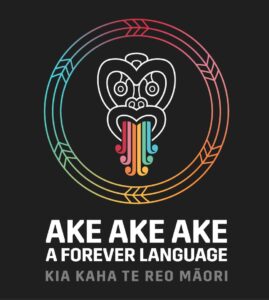
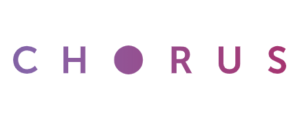 Chorus is celebrating Te Wiki o Te Reo Māori with the following activities:
Chorus is celebrating Te Wiki o Te Reo Māori with the following activities:
 For Whakaata Māori, Te Wiki o Te Reo Māori is how we live and work every week, and we focus on Mahuru Māori as a whole to mark the revitalisation of te reo Māori. This year is extra special, with it being 50 years since the Māori Language Petition kickstarted the reo revitalisation movement.
For Whakaata Māori, Te Wiki o Te Reo Māori is how we live and work every week, and we focus on Mahuru Māori as a whole to mark the revitalisation of te reo Māori. This year is extra special, with it being 50 years since the Māori Language Petition kickstarted the reo revitalisation movement.
Kawhe me te whawhe, kapa haka and games in te reo Māori all continue to happen every week. What made this week stand out was our Māori Language Moment as a whare on Wednesday, followed by a kaitahi so our kaimahi could come together to kōrero in reo Māori over some kai.
The importance of raising awareness of the revitilisation of te reo Māori is our main goal, which is why broadcasting by Māori, for Māori is so vital. With this as our foundation, we livestreamed and broadcasted the events celebrating the 50th Anniversary of the Māori Language Petition at Parliament on Wenerei to make it accessible to everyone. It was hosted by our own Moana Maniapoto.
And to end this special wiki, we had a guest speaker, Eru Kapa-Kingi, come in on Paraire to talk to our kaimahi about the Treaty of Waitangi and te reo Māori.
|
|
 Auckland Airport is proudly celebrating te wiki o te reo Māori – Māori Language Week again this year. We’ve had a busy week of activity including introducing a karakia to our regular employee morning call and talking about people learning their own mihi. Our values now include te reo Māori translations and we’ve also shared recorded pronunciations. Employees also have an opportunity to learn our waiata as part of onboarding. There are bi-lingual signs up in the terminal on the flight display boards (FIDS) and all of our meeting rooms now have print outs of te reo Māori greetings and farewells available for people to make use of.
Auckland Airport is proudly celebrating te wiki o te reo Māori – Māori Language Week again this year. We’ve had a busy week of activity including introducing a karakia to our regular employee morning call and talking about people learning their own mihi. Our values now include te reo Māori translations and we’ve also shared recorded pronunciations. Employees also have an opportunity to learn our waiata as part of onboarding. There are bi-lingual signs up in the terminal on the flight display boards (FIDS) and all of our meeting rooms now have print outs of te reo Māori greetings and farewells available for people to make use of.
We’ve also setup visual displays in areas like our lunchrooms showcasing key te reo Māori phrases, culture and information. In partnership with Te Tari, this week we were also really pleased to launch a pilot 10-week te reo Māori language class that will run this side of Christmas. We’ve had great interest so far and are already looking forward to being able to extend this programme in 2023. It’s all about building an inclusive culture together – and one where everyone is encouraged to be curious and open to learning.
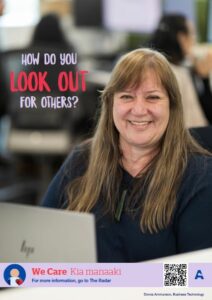
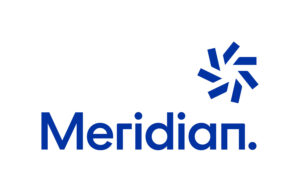 We have an intranet article up encouraging people to:
We have an intranet article up encouraging people to:
It’s been heart-warming seeing how many people have been uploading their pepeha to our Yammer channel.
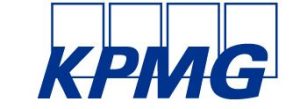 It was a fantastic week at KPMG as we celebrated Te wiki o te reo Māori in our offices across the motu. We’ve shared kai, te reo experiences, and waiata with each other and whānau. Here’s a snapshot of some of the action from this week. Kia pai o rā whakatā!
It was a fantastic week at KPMG as we celebrated Te wiki o te reo Māori in our offices across the motu. We’ve shared kai, te reo experiences, and waiata with each other and whānau. Here’s a snapshot of some of the action from this week. Kia pai o rā whakatā!
 Transpower’s celebrations included a range of activities, such as:
Transpower’s celebrations included a range of activities, such as:
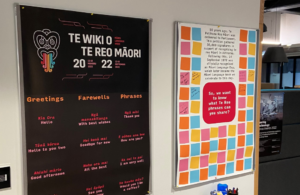
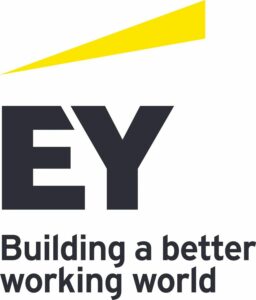
EY’s Te Wiki o Te Reo Māori Objectives:
Key activations across all offices include:
As well as a range of Print Resources, including, Learning Placemats, Leading with culture – Tri-fold boardroom resource.
In addition, EY launched Tuia, the EY Māori Staff Support Network, with the focus of:
Additionally, EY conducted face-to-face sessions for waiata practice, karakia practice, and whakatau practice.
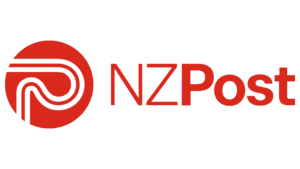 At NZ Post we are celebrating Te Wiki o Te Reo Māori by launching a new project, Te Kai a te Rangatira or in English “Food of the Chiefs.” This initiative focuses on encouraging, educating and supporting both Maori and non-Maori to engrain more Te Reo in their daily lives.
At NZ Post we are celebrating Te Wiki o Te Reo Māori by launching a new project, Te Kai a te Rangatira or in English “Food of the Chiefs.” This initiative focuses on encouraging, educating and supporting both Maori and non-Maori to engrain more Te Reo in their daily lives.
Te Kai a te Rangatira is an initiative that 5 of our graduates from NZ Post’s Maori leadership programme, Te Hononga, developed over a 6 month period after identifying that their NZ Post Whanau don’t always have the tools and sometimes confidence to speak, or try to speak Te Reo. Their initiative was pitched to our Executive Leadership Team (ELT), and was signed off for implementation and is now sponsored by our Chief Customer Officer, Bryan Dobson.
Te Kai a te Rangatira will start with focusing on providing NZ Post whānau short videos and putting up posters at our sites around the country using English phonic breakdowns of Te Reo Kupu (words), that people can easily relate to. Attached is one of the posters, that also includes a QR code so that people can be taken to a video where they can hear how the kupu is pronounced.
Prior to launching this initiative, Heremia Nikora, who is a part of Te Kai a te Rangatira was asked recently by one of NZ Post’s Executive Leaders how they would encourage those who are intimidated by Te Reo Māori, as a result of pronunciation and he answers below.
“Our Roopu Project name comes from a whakatauki (proverb) that speaks to the importance of communication, especially for leaders. Understanding this, we’ve sought to further define what kai (food) means in our name – Te Kai a te Rangatira – Food of the Chiefs.
I’m sure it’s no secret, but my physical stature would suggest that I’m privy to an extra bite here and there, especially if it’s a homecooked meal. The thing with homecooked meals is that they are hearty, warming and most of all, they’re made with love – that’s how you receive it and that’s what makes it delicious. In line with pronunciation, we want everyone to understand that we don’t expect you to be a master chef, and that we’ll hear your te reo like we’re eating a home cooked meal. We see your intent and deeply appreciate it – that’s the example we want all to see and most of all it’s what we want you to know.”
Throughout this week our Communications team have released videos from our ELT talking to what their connection is to speaking Te Reo and how they are passionate about wanting to speak more Te Reo. This is also complimented by more videos of people around our business providing short videos around how to pronounce basic words.
Although Te Kai a te Rangatira was launched at the start of Te Wiki o Te Reo Māori, we don’t want this to be a one week catch you next year journey. Over the next 52 weeks, to support the wider NZ Post whānau with their own Te Reo journey, they will continue to share tools, posters and videos to assist our people with pronunciation and how to grow their vocabulary, from greetings and everyday words to NZ Post projects that incorporate Te Reo and place names.
 We have had a lot of fun celebrating Te Wiki o Te Reo Māori this week at New Zealand Rugby! We kicked things off with Kupu o te Rā – with a new te reo Maori word loaded up on all computer lockscreens each day this week, and the Black Ferns, All Blacks sharing some significant kupu and kōrero on their socials and youtube.
We have had a lot of fun celebrating Te Wiki o Te Reo Māori this week at New Zealand Rugby! We kicked things off with Kupu o te Rā – with a new te reo Maori word loaded up on all computer lockscreens each day this week, and the Black Ferns, All Blacks sharing some significant kupu and kōrero on their socials and youtube.
Both our Tāmaki Makaurau and Te Whanganui-a-tara offices spent time together this week to celebrate, with Māori All Blacks Kaumatua and NZR Kaihautu Māori Luke Crawford joining both events to lead us through kai, karakia and a kōrero about trophies and taonga in rugby. When our minds, hearts and bellies were full, we practised a waiata Luke wrote for NZR – Te Whare Whutupōro. Luke also joined the All Blacks podcast for a special episode for Te Wiki o te reo Māori.
Our 2nd cohort of Maori Language learners completed their level one training this week, and a third group started. To showcase some of their new skills staff filmed themselves saying their pepeha for our weekly staff pānui. And to permanently mark the significance of this week, we added New Zealand Rugby’s te reo Māori name to our email signatures – Whutupōro Aotearoa.
Kia kaha te reo Māori!
 Throughout this year’s Te Wiki o Te Reo Māori we have enjoyed celebrating, learning, and growing our knowledge around te reo Māori in our Te Whanganui-a-Tara and Tāmaki Makaurau offices at Russell McVeagh. Our celebrations focused around learning and growing our knowledge of te reo Māori which is a taonga (gift) to us all. We very much tautoko (support) this kaupapa and across the week there has been korero, kai and activities throughout. This year was extra special as 14 September marked the 50th anniversary of the Māori Language Petition, an event that marked the starting point for significant revitalisation of te reo, including Te Wiki o te Reo Māori.
Throughout this year’s Te Wiki o Te Reo Māori we have enjoyed celebrating, learning, and growing our knowledge around te reo Māori in our Te Whanganui-a-Tara and Tāmaki Makaurau offices at Russell McVeagh. Our celebrations focused around learning and growing our knowledge of te reo Māori which is a taonga (gift) to us all. We very much tautoko (support) this kaupapa and across the week there has been korero, kai and activities throughout. This year was extra special as 14 September marked the 50th anniversary of the Māori Language Petition, an event that marked the starting point for significant revitalisation of te reo, including Te Wiki o te Reo Māori.
Our people were encouraged to get involved and do something for Te Wiki o Te Reo Māori no matter how big or small: learn a kaikōhau or mihi, play waiata Māori or test their knowledge with a Kahoot Quiz. Daily comms included creative resources to get involved and give te reo a go and shared how our people can get involved in learning te reo Māori including online and in-person te reo Māori classes that are offered at our firm, as well as highlighting some of the work Russell McVeagh has been involved in relating to some of our clients who encompass a wide range of entities operating within te ao Māori.
We had the pleasure of hosting Megan Tapsell, Head of Pacific Technology, ANZ, who shared her experiences embedding tikanga and championing diversity & inclusion at ANZ. She spoke about her vision and motivation to increase Māori engagement both in the corporate technology industry and in the services they produce. It was an important discussion which will no doubt assist our future conversations and thinking about how we can continue to create a more inclusive and diverse culture at Russell McVeagh and our focus on further embedding Tikanga and embracing te ao Māori at our firm.
Whāia te mātauranga hei oranga mō koutou – Seek knowledge for the sake of your wellbeing.
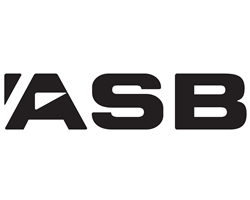 I’m delighted to share with you our activity as part of Te Wiki o te reo Māori, which forms part of a broader strategic journey we’re on at ASB to authentically embrace Te Ao Māori into our organisation through language, culture and how we improve outcomes for Māori customers and communities including our own Kaimahi Māori at ASB.
I’m delighted to share with you our activity as part of Te Wiki o te reo Māori, which forms part of a broader strategic journey we’re on at ASB to authentically embrace Te Ao Māori into our organisation through language, culture and how we improve outcomes for Māori customers and communities including our own Kaimahi Māori at ASB.
This year, we created an integrated campaign with a theme inspired by the whakataukī “Tūwhitia te hopo, mairangatia te angitū! Feel the fear and do it anyway!”. We know that it can be daunting to try something new and many ASBers have shared that they felt nervous about incorporating more reo Māori into their day-to-day for fear of getting it wrong, not nailing the pronunciation, or offending someone. So, this year we encouraged everyone across the business to feel the fear and have a go anyway by embracing the language and showcasing ASBers on their journey.
While it’s been incredibly important to celebrate and acknowledge Te Wiki o te reo Māori this week, this activity forms part of our broader mahi to deliver on our Te Ao Māori strategy which we’re committed to striving towards every day of the year.
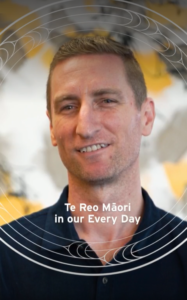
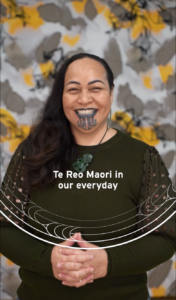
 Here at Te Peke o Aotearoa (The bank of New Zealand) we have a range of ways that we are celebrating Te wiki o te reo Māori and continue to embed te reo Māori in our company.
Here at Te Peke o Aotearoa (The bank of New Zealand) we have a range of ways that we are celebrating Te wiki o te reo Māori and continue to embed te reo Māori in our company.
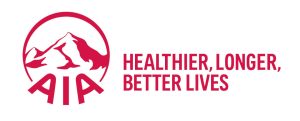 A Kai and Kōrero event has been put on to bring the people of AIA together for Te Wiki o te Reo Maori. In addition, some longstanding te Reo and te ao principles have been extended through the AIA team. Not only have AIA updated their Leadership Essentials (values) in te reo, they’ve created Te Reo@AIA; a guide on how to create your own pepeha, provided examples of karakia, waiata as well as practical tips on how to successfully understand and incorporate macrons. Not only that, AIA has made sound bites of how to correctly pronounce their te Reo themed meeting room and provided translating documents designed to get the team familiar with words in te Reo.
A Kai and Kōrero event has been put on to bring the people of AIA together for Te Wiki o te Reo Maori. In addition, some longstanding te Reo and te ao principles have been extended through the AIA team. Not only have AIA updated their Leadership Essentials (values) in te reo, they’ve created Te Reo@AIA; a guide on how to create your own pepeha, provided examples of karakia, waiata as well as practical tips on how to successfully understand and incorporate macrons. Not only that, AIA has made sound bites of how to correctly pronounce their te Reo themed meeting room and provided translating documents designed to get the team familiar with words in te Reo.
“Ko te reo te mauri o te mana Māori. Ko te kupu te mauri o te reo Māori. E rua ēnei wehenga kōrero e hāngai tonu ana ki runga i te reo Māori. Ko te reo, nō te Atua mai.
The language is the life force of the mana Māori. The word is the life force of the language. These two ideas are crucial to the Māori language. A language that is a gift from God”
— Sir James Hēnare, 1911–1989